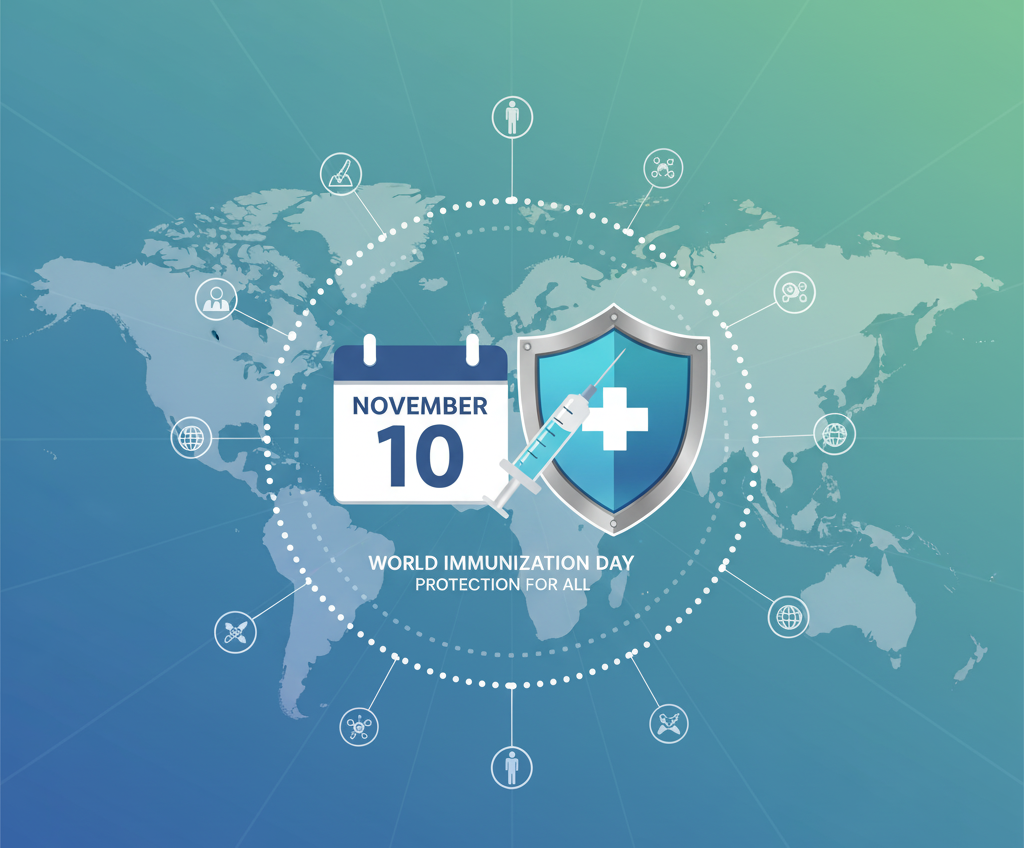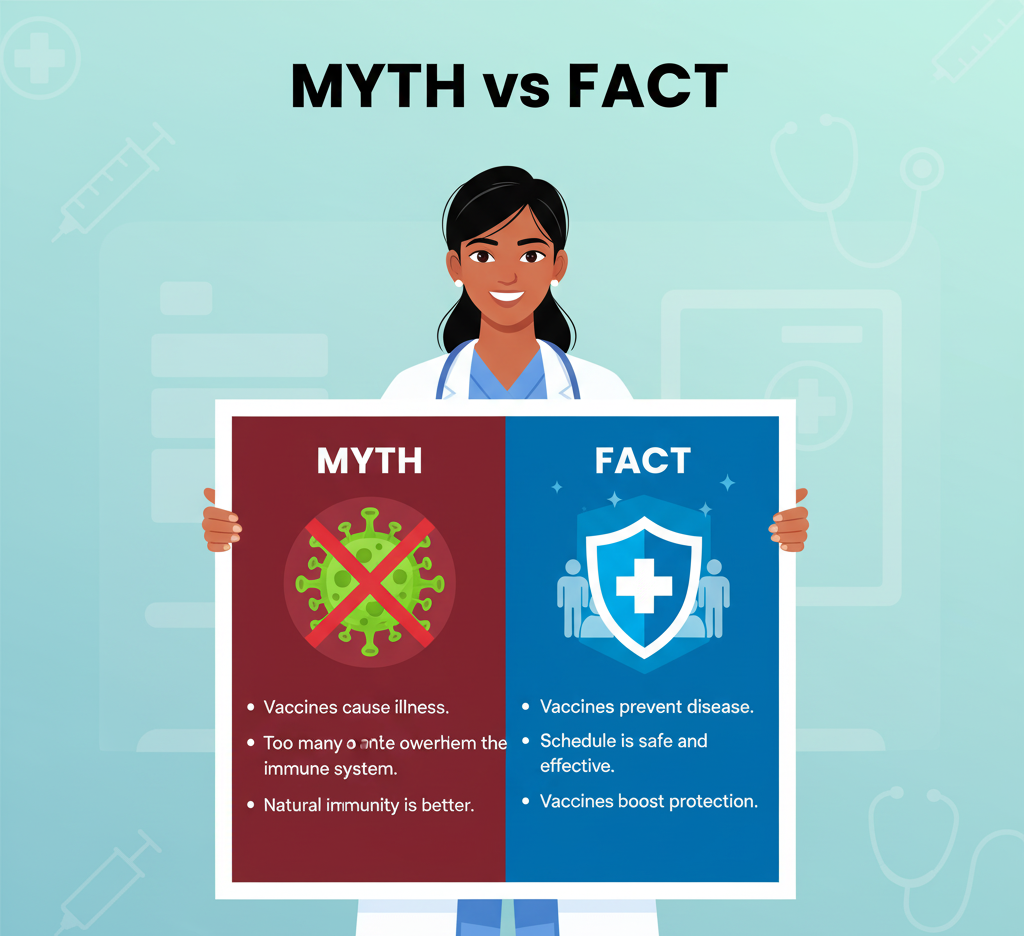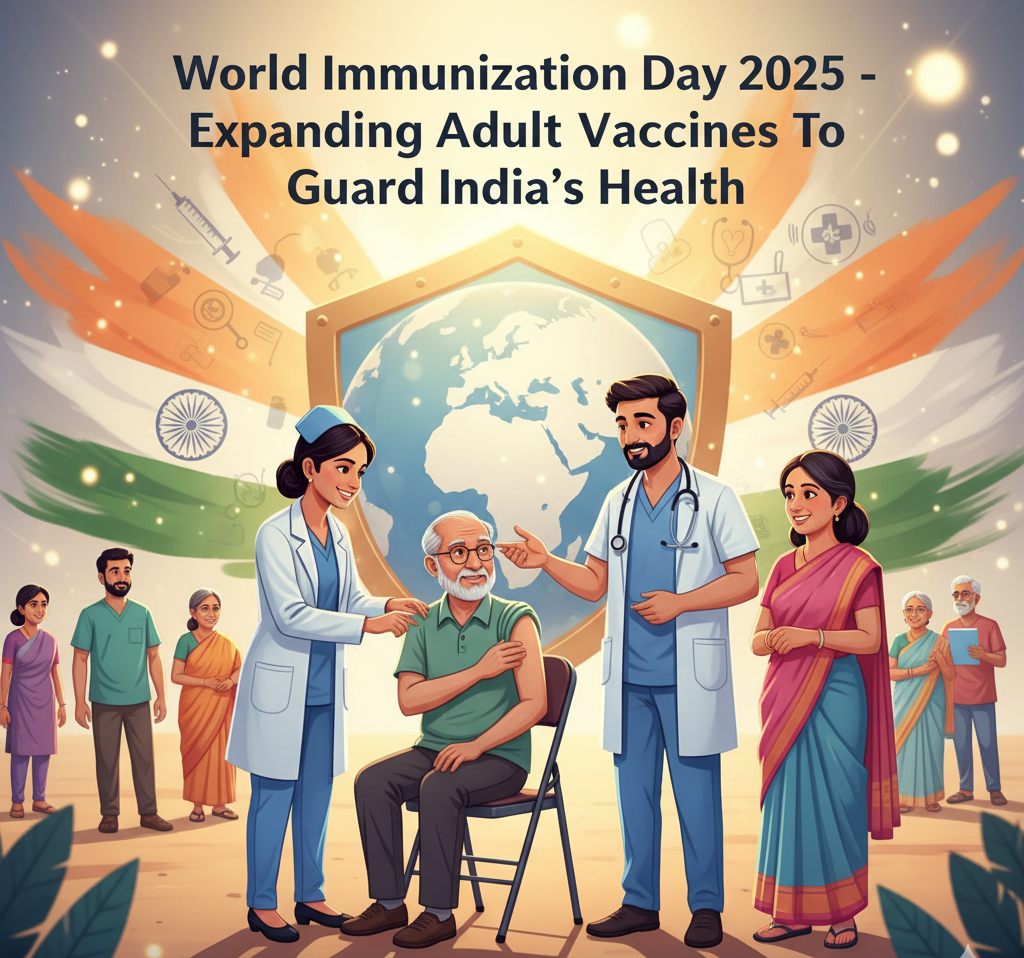Introduction: Why Immunization Is Not Just for Kids
Every year, World Immunization Day on November 10 reminds us of the life-saving power of vaccines. For decades, vaccines have prevented deadly diseases and protected millions of lives. However, vaccination shouldn’t stop at childhood — it must continue into adulthood and old age.
In 2025, India is focusing on expanding adult immunization as part of its public health mission. While childhood immunization rates have improved, adult coverage remains low, especially among vulnerable groups such as seniors and those with chronic conditions.
This year’s theme — “Lifelong Protection for All” — encourages every Indian to view vaccination as a lifelong responsibility.

What Is World Immunization Day?
World Immunization Day is celebrated globally on November 10 to spread awareness about the role of vaccines in preventing disease and disability. It honors the progress made through immunization programs and highlights the work still needed to ensure equitable access.
Vaccines are one of the most cost-effective public health tools, preventing more than 2–3 million deaths every year worldwide. From childhood diseases like measles and polio to adult infections like flu and pneumonia, immunization continues to protect entire communities.
Why Adult Immunization Matters in India
Many Indian adults believe vaccines are only for children. But as immunity from childhood vaccines wanes, adults become vulnerable again. Add to that modern factors like urban pollution, travel, stress, and chronic disease — and the need for adult immunization becomes clear.
Adults and seniors face higher risks from diseases like influenza, shingles, hepatitis, and pneumonia. Vaccines for these illnesses can reduce hospitalizations, prevent long-term complications, and save lives.
Healthcare for seniors especially benefits from routine vaccination, as older adults are more likely to have weakened immunity and slower recovery rates.
Top Vaccines Recommended for Adults in India (2025)
1. Influenza (Flu) Vaccine
Protects against seasonal flu viruses that change yearly.
-
Recommended annually for adults over 50 or those with chronic illnesses.
2. COVID-19 Booster
Maintains protection against new variants of the coronavirus.
-
Follow current Ministry of Health and Family Welfare guidelines.
3. Tdap (Tetanus, Diphtheria, and Pertussis)
Boosts immunity against three serious bacterial infections.
-
One booster every 10 years.
4. Pneumococcal Vaccine
Prevents pneumonia, meningitis, and bloodstream infections.
-
Recommended for adults above 60 and those with lung or heart disease.
5. Hepatitis B Vaccine
Prevents chronic liver disease and liver cancer.
-
Three-dose schedule (0, 1, and 6 months).
6. HPV Vaccine
Protects against human papillomavirus-related cancers.
-
Recommended for both men and women up to age 45.
7. Shingles (Herpes Zoster) Vaccine
Prevents painful rashes and nerve pain caused by the varicella-zoster virus.
-
Recommended for adults over 50.
8. Typhoid and Hepatitis A Vaccine
Recommended for adults in areas with poor sanitation or frequent travelers.
9. MMR (Measles, Mumps, Rubella) Booster
Advised for adults who missed childhood doses or work in healthcare.
10. Meningococcal and Japanese Encephalitis Vaccines
Recommended for travelers and high-risk populations.
Vaccines for Seniors: A Lifelong Shield
As people age, their immune systems weaken, increasing susceptibility to infections. Vaccines for seniors act as an extra layer of protection — not only preventing diseases but also reducing hospital admissions.
Seniors who receive flu or pneumonia vaccines experience fewer respiratory infections, lower hospitalization rates, and faster recovery. Adult immunization, therefore, supports independent living and better quality of life for India’s elderly population.

Common Myths and Facts About Adult Immunization
| Myth | Fact |
|---|---|
| Vaccines are only for children. | Adults and seniors also need vaccines to maintain immunity. |
| I was vaccinated as a child; I’m still protected. | Some vaccines require boosters to stay effective. |
| Vaccines can cause illness. | Most vaccines cause only mild side effects like soreness or fever. |
| Natural immunity is stronger. | Vaccine immunity is safer and more predictable. |
| Healthy people don’t need vaccines. | Even healthy adults can contract or spread infections. |
How India Is Strengthening Adult Immunization
The Indian government, WHO, and health-tech platforms like Quickobook are working to expand adult vaccination programs by:
-
Integrating adult vaccines into primary healthcare.
-
Conducting awareness campaigns during World Immunization Day.
-
Promoting digital health records and online doctor consultations.
-
Offering corporate vaccination drives for working adults.
These initiatives ensure that adults can easily access vaccines without long hospital queues or confusion about eligibility.
Vaccines as a Part of Preventive Healthcare
Vaccination is an essential part of preventive healthcare. It not only prevents illness but also reduces healthcare costs by avoiding expensive hospital treatments.
For working adults, it means fewer sick days and better productivity. For seniors, it means fewer hospital visits and more healthy years of life.
When Should You See a Doctor?
If you are unsure about your vaccination history, consult a Quickobook general physician. Your doctor will:
-
Review your immunization records.
-
Suggest age-appropriate vaccines.
-
Provide guidance on boosters and travel vaccines.
Remember: prevention today is protection for tomorrow.
Conclusion: A Healthier Future Through Immunization
As India celebrates World Immunization Day 2025, it’s time to extend vaccine awareness beyond childhood. Protecting adults and seniors through vaccination strengthens our nation’s health and economy.
Let’s pledge to make lifelong immunization a habit — because vaccines are not just for kids; they’re for everyone.
Quickobook CTAs
Protect your health at every age!
Book a Quickobook vaccination consultation with a trusted doctor today.
Online or in-clinic — convenient, fast, and safe.
Visit Quickobook.in to locate nearby vaccination centers.
Get expert advice on adult and senior immunization schedules.
Frequently Asked Questions (50 Expert Answers)
1. When is World Immunization Day celebrated?
World Immunization Day is celebrated every year on November 10.
2. What is the theme of World Immunization Day 2025?
The theme is “Lifelong Protection for All.”
3. Why is immunization important for adults?
It helps prevent diseases like flu, hepatitis, and pneumonia, which can be serious in adults.
4. Which vaccines are recommended for Indian adults?
Flu, COVID-19 booster, Tdap, Hepatitis B, Pneumococcal, and HPV vaccines.
5. Do adults need vaccine boosters?
Yes, some vaccines like Tdap need boosters every 10 years.
6. Is the flu vaccine necessary every year?
Yes, because flu strains change annually.
7. What vaccines should seniors take?
Influenza, pneumococcal, shingles, and COVID-19 boosters.
8. Is vaccination safe for older adults?
Yes, vaccines are tested and safe for seniors.
9. Can vaccines cause fever?
A mild fever is a normal immune response after vaccination.
10. Can vaccines cause serious side effects?
Serious reactions are very rare and usually manageable with prompt care.
11. Are vaccines free in India?
Some are free under government programs; others may require payment at private clinics.
12. Can adults take vaccines at home?
Vaccines should be given at authorized clinics or hospitals by trained professionals.
13. How can I check my vaccination record?
Consult your doctor or check your CoWIN and Quickobook records.
14. What is the pneumococcal vaccine for?
It protects against pneumonia and serious bacterial infections.
15. Is the HPV vaccine only for women?
No, it is also recommended for men to prevent HPV-related cancers.
16. Can pregnant women get vaccinated?
Yes, certain vaccines like Tdap and flu are safe during pregnancy.
17. How does vaccination protect the community?
It builds herd immunity, reducing disease spread.
18. Do healthy adults need vaccines?
Yes, even healthy individuals can catch infections.
19. What happens if I miss a vaccine dose?
Consult your doctor — most schedules can be resumed safely.
20. Can vaccines prevent cancer?
Yes, HPV and Hepatitis B vaccines prevent certain cancers.
21. Is it safe to take multiple vaccines together?
Yes, doctors often combine vaccines safely for efficiency.
22. What is herd immunity?
When enough people are vaccinated, disease spread is minimized.
23. Can adults get measles or mumps again?
Yes, if not properly vaccinated as children.
24. Are adult vaccines available in small towns?
Yes, through government health centers and Quickobook-linked clinics.
25. How often should I get a tetanus shot?
Every 10 years.
26. Can vaccines cause allergies?
Allergic reactions are rare; discuss your history with your doctor.
27. Does vaccination affect fertility?
No, vaccines do not affect fertility.
28. Can I get vaccinated if I have diabetes?
Yes, it’s highly recommended for diabetics.
29. Can vaccines help prevent hospitalizations?
Yes, they significantly reduce severe illness and hospital stays.
30. Do I need vaccination before traveling abroad?
Yes, depending on the country — check with your doctor.
31. What is the shingles vaccine for?
It prevents painful rashes caused by the varicella-zoster virus.
32. Can vaccines cause fatigue?
Mild fatigue is normal after vaccination and fades quickly.
33. Are vaccines effective immediately?
Most take 2–3 weeks to build full immunity.
34. Can seniors take flu and COVID-19 vaccines together?
Yes, if recommended by a healthcare provider.
35. Are adult vaccines mandatory in India?
Not mandatory, but strongly advised for public health.
36. Do vegetarians need special vaccines?
No, vaccine needs are the same for everyone.
37. Are vaccines safe for people with heart disease?
Yes, and they help prevent complications from infections.
38. Can vaccines help manage chronic conditions?
They prevent infections that could worsen existing diseases.
39. Are vaccines stored safely in India?
Yes, through cold-chain logistics in both public and private facilities.
40. Can vaccines be given during antibiotic treatment?
Yes, in most cases, unless your doctor advises otherwise.
41. How do vaccines save money?
They prevent costly hospital treatments for preventable illnesses.
42. Do adults need the polio vaccine?
Most adults don’t if fully vaccinated in childhood.
43. Can I skip vaccines if I rarely fall sick?
No, immunity weakens with time — boosters are essential.
44. Do vaccines expire?
Yes, always check expiry dates before administration.
45. Are there vaccines for HIV?
Not yet, though research is ongoing.
46. Do vaccines cause autism?
No, this is a myth — vaccines are scientifically proven safe.
47. How do vaccines help India’s economy?
Fewer sick days mean higher productivity and lower healthcare costs.
48. What role does Quickobook play in immunization?
Quickobook connects patients with verified doctors for safe vaccination consultations.
49. How can I book a vaccination consultation?
Visit Quickobook.in or use the app to schedule a doctor visit online.
50. What’s the message of World Immunization Day 2025?
Vaccines protect every age — safeguard yourself and your community for life.









Comments (0)
No comments yet. Be the first to share your thoughts!
Leave a Comment